- Home
- Martin Amis
Time's Arrow Page 5
Time's Arrow Read online
Page 5
Rather as I feared they would, babies have started showing up in Tod’s dreams. They’ve shown up. Or, at least, one of them has. Nothing gruesome happens, and I am coping with it fine so far.
You naturally associate babies with defenselessness. But that’s not how it is in the dream. In the dream, the baby wields incredible power. It has the power, the ultimate power of life and death over its parents, its older brothers and sisters, its grandparents, and indeed everybody else who is gathered in the room. There are about thirty of them in there, although the room, if it is a room, can’t be much bigger than Tod’s nook of a kitchen. The room is dark. More than this, the room is black. Despite the power it wields, the baby is weeping. Perhaps it weeps precisely because of this sinister reversal—the new and desperate responsibilities that power brings. In the faintest of whispers the parents try to give comfort, try to quieten: for a moment it seems that they might even have to stifle. There is that excruciating temptation. Because the baby’s drastic ascendancy has to do with its voice. Not its fat fists, its useless legs, but its voice, the sounds it makes, its capacity to weep. As usual, the parents have the power of life and death over the baby, which all parents have. Now, though, in these special circumstances and in this special room, the baby has the power over them. And over everybody else who is gathered there. About thirty souls.
The whole thing is a lot tougher on Tod than it is on me. I’m always awake when the dreams happen. And I am innocent.… The sick shine of imposture and accusation—I don’t get that. I know he’s only dreaming. I just settle back, with some apprehension, admittedly, and give witness to the late show screened by Tod’s head, by his secret mind—by his future. When the time comes to experience the events that Tod’s dreams foretell (when we find out, for instance, how the baby came to wield such power), then maybe I will take it harder. Tod himself weeps like a baby before the dreams happen. Occasionally, nowadays, Irene is around to psych him up before he goes in there.
On the TV (look)—on the rooftop, on the ledge, high up, the crying man in the dirty white shirt, holding a baby. Nearby, a policeman, urgently crouched, all cocked and bunched for this urgent encounter or transaction. The cop is saying through his bullhorn that he wants to take the baby. In effect, he wants to disarm the crying man in the dirty white shirt. The crying man has no weapon. The baby is the weapon.
That’s not how things stand in the black room, with its groping carbon, its stilled figures. I just know this. In here, the baby is not a weapon. In here, the baby is more like a bomb.
Just when Tod has established our relationship with Irene on a secure footing, the kind of setup that any sane man would kill for, with her punctual visits and affectionate phone calls, the movies we enjoy together, the fine dining, the peace and safety (the forgiveness) that her presence confers, plus the exquisitely torpid lovemaking that takes place right on the button every couple of months or so, and reaching the stage, now, where I think we can tackle her, gently but firmly, about her untidiness around the house, because it’s best to get these things out in the open, not to let them rankle and fester, and so on—guess what. Tod has started fooling around. Yeah. With Gaynor.
One Sunday afternoon we took a trancelike ride in the car out to Roxbury, and parked, and strolled the streets, and there she was, standing at her front door in a blue dressing gown with her arms folded and with a look of amused reproach on her face. “You old bastard,” she called out. But we got talking to her anyway. I didn’t think anything was up until we went inside. Tod, I wanted to say: don’t do this. The voice of conscience. It speaks in a whisper. Nobody hears it. One thing led to another—actually it was more like the other way around. After an initial lull we now go out to Gaynor’s regularly, every other week.
It’s called two-timing, or double-lifting, and that’s exactly how it feels. There is integrity-loss. On the other hand it’s a buzz physically, I admit, because our new friend has been around quite a bit longer than Irene. This little honey’s only fifty-four. But I’m upset. To be frank, I’m scandalized. Last week he went out with another one: Elsa. Just lunch, fortunately. It was a very acrimonious occasion and she called us some terrible names. I thought it was a disaster but something tells me that Tod’s still hopeful. Is this allowed? I feel as if we’re about to get arrested. What’s the limit?
Suddenly, to Tod’s glands, the world is a woman. Even the sharpness of the city, on a wet night, the veils of rain, the stained darkness—it’s a woman. Their shapes are everywhere, and sending messages to his glands. I wonder if Tod’s new interest in women is a professional interest, connected to his dealings with them at AMS: his custodial scrutiny of disturbed or distempered female flesh. But his new interest in women seems far too broad and anarchical; it isn’t specialized. Unwinding, we sink into the armchair with a coffee cup, and gaze out of the window, and then he’ll see an outline across the road (now what?), through the fence, through the leaves, and he’ll vainly crane and peer, and tip forward onto his feet.
Why? In case it’s a woman.
The parallaxes of the stockyards shift and quake. Industry is coming to the city. Gas is cheap. Things move faster than they used to. The insane have been taken off the street; we don’t ask where they’ve disappeared to. Never ask. It’s better if you never ask. No longer the nomads, the nightrunners … Instead there is a burly altruism abroad. People all have jobs now, at the steel mill and the auto plant. They wash the wind. Just as they clean up all the trash and litter, they also clean up the earth and the sky, transmogrifying cars, turning tools, parts, weapons, bolts, into carbon and iron. They’ve really got to grips with their environmental problems, facing them squarely, with common purpose. Time for talk is over. There is no talk. Just action. To total sickness you bring total cure. Now there’s less room for thought and for feeling, and it seems a great tiredness is good for keeping people steady. Work liberates: Friday evenings, as they move off toward it, how they laugh and shout and roll their shoulders.
Tod loves crowds. In crowds you can be a leader without anyone noticing. Like with the flared pants. He’s been sporting those flares of his for quite some time and now everyone is into them. Also the flower shirts and the unctuous neckerchiefs, and that caftan or dhoti he dons at weekends—white, and similar in cut to his surgical smock, but with different associations. It’s disgusting at his age, I agree, but old people do it and no young people say they can’t. Fashion is crowds. Tod wears the red armband too, along with everybody else. Crowds make me paranoid and claustrophobic but Tod seeks and loves the company of crowds. With rapture and relief he elides with the larger unit, the glowing mass. He sheds the thing he often can’t seem to bear: his identity, his quiddity, lost in the crowd’s promiscuity. My presence is never tinier. But it’s the same story. Render up your soul, and gain power.
Under thunderheads, beneath cloudcover like a coated tongue with a doctor’s penlight playing on it, as in a dark carnival, we protest the Vietnam War, with vivified, uplifted faces, with the press of bodies all moving the same way, and with that sense of being both lost and right, lost and right. We’re half a mile long and young and old and white and black and girl and boy, looking for a monster to kill or create. Signs and banners say the usual things about peace, about war, together with more particular demands like END DE FACTO SEGREGATION and FIRE MRS. AINTREY. Tod stares at FIRE MRS. AINTREY. He doesn’t want to fire Mrs. Aintrey. He probably wants to find Mrs. Aintrey—and love her up. He certainly couldn’t give two shits about the Vietnam War. Neither is he here, in fairness, just to get women. On the contrary: he’s here to get rid of them, to lose them, to drift away from them in the heat and safety of the crowd.
There is another war coming. Oh, yes, we do know that. A big war, a world war, which will roll through villages. It wearies me to imagine the preparations that will prove necessary, what dismantlings and shovelings, what wounds worked open for the sudden closure.… There’s exactly twenty-five years to go before it starts. That’s how com
e there’s so much stuff about it everywhere you look: even everywhere Tod looks. I thought for a while that the information would just go on accumulating from here on in, but thank God it’s already begun dropping off.
For Tod is highly sensitive to this material. It affects him like a smell, like a chime. Too late … There is the same kind of trigger when he hears that other language, not such a rare occurrence now, especially in Roxbury, where he wanders on those Sundays; it is a language in which machines might converse when no human being is around to listen. A third thing makes the trigger slip: nail-clipping. It’s the odor the sallow rinds give off, as they cook and crackle in the fire.…
I’ve seen the dates. We’re nowhere near young enough for the present war, but when the world war comes—we’ll be just right to fight it. We are, after all, a superb physical specimen. Our feet aren’t flat. Our vision is clear. We’re not clubfooted or Marxist or nuts. We have no conscientious objections or anything of that kind. We’re perfect.
The standard affair, nowadays, will start something like this. It starts, in effect, with a moment of horror.
Most typically it starts with a late-night drive to some little restaurant. The waiter has just brought us our dough, our honorarium or whatever it is, and we’re sitting there quietly snorting and drooling into our brandy balloon, and relishing a perspicacious perfecto. We become aware that people are looking at us. And we don’t like it when people are looking at us.… Then our eyes will be firmly caught and firmly held by a bent female figure hurrying in through the door and across the room toward us. Fair, dark, slim, plump, elegant, not so elegant. Then she spins round. It’s a big power moment when they spin round, with the flourish of challenge, and we get to see what they look like. Speaking personally, for now, it’s always cause for alarm, when they spin round—whatever they look like. Because here’s the weird thing about these relationships with women: you get everything on the first date. Well, every now and then it’s the second date, but generally it’s the first. Instant invasion. Instant invasion and lordship. An hour or two here, max, is all it takes. Oh, mercy. You can go up to a woman on a street corner and start yelling at her and ten minutes later she’s back at your place doing God knows what. On more than one occasion the first physical contact, the first touch, has been a slap or a shove: the swipe of her hand across Tod’s feeble leer of—what? Lust? Contempt? All that needs to happen, in between, is this moment of horror I mentioned. It activates; it legitimates. It seems to be a necessary condition.
So she’ll settle at the table, flushed, exalted, imperious, resolute—anyway, thoroughly pissed off—and I’ll get the ball rolling with something like,
“Don’t go—please.”
“Goodbye, Tod.”
“Don’t go.”
“It’s no good.”
“Please.”
“There’s no future for us.”
Which I greet, I confess, with a silent “Yeah yeah.” Tod resumes:
“Elsa,” he says, or Rosemary or Juanita or Betty-Jean. “You’re very special to me.”
“Like hell.”
“But I love you.”
“I can’t look you in the eye.”
I have noticed in the past, of course, that most conversations would make much better sense if you ran them backward. But with this man-woman stuff, you could run them any way you liked—and still get no further forward.
“Please. You can sleep over.”
“This is goodbye, Tod.”
“Beth,” he’ll say. Or Trudy or whatever.
“It just doesn’t sit well with me anymore.”
“Give me one more chance.”
Then they launch into this routine. It lasts from nuts to soup. Don’t get them wrong: Tod has his good points. He is, it is widely allowed, “very affectionate” (I think I know what that means. But how would they know?). And they don’t go on about his obvious flaws, like his being a doctor and having three dozen girlfriends. No, the trouble is, apparently, that Tod can’t feel, won’t connect, never opens up, always holds something back. What Trudy and Juanita and the rest of them are trying to say, it seems to me, is that Tod gives them the creeps. But whatever it is, whatever it is they’re saying or trying to say, it never cramps Tod’s style.
He likes to make love in the deathly hour of dusk. He won’t let them sleep over—another much-discussed shortcoming. Only Irene ever sleeps over.… On her lap Beth’s handbag yawns. She’s miserable that it all has to end. Me, I’m miserable that it’s all beginning. By the time we’re on the other side of this, I know (I’m experienced), by the time I’ve become really fond of them and their pretty ways, they will start to recede, irreversibly, fading from me, with the lightest of kisses, the briefest squeeze of the hand, the brush of a stockinged calf beneath the table, a smile. They’ll be fobbing us off with the flowers and the chocolates. Oh yes. I’ve been there. Then, one day, they just look right through you. Next thing you know they switch jobs or cities. All of a sudden they have kids to put through college or they’re shacked up with some old wreck of a husband.
Rounding it off with a cocktail, we finish our meal and sit there doggedly describing it to the waiter, with the menus there to jog our memory. Silence in the car on the way back to his place and the act of love in the hour of dusk. Preceded, as I said, by the moment of horror. And it isn’t without its pathetic aspects anyway, this evening scene with the two mature parties, their spectacles, their hair, their heavy old shoes, and the extra trust that she in particular will be needing to feel, and may not feel. Here it comes, like a chime. A naked female stare. Her body is probably naked by now but there is nothing as naked as human eyes: they haven’t even got skin over them. Like a chime, the moment of intense focus. That same look—full understanding, unwelcome wonder—as if they have just seen everything, even the figure in the dream with his white coat and his black boots and, in his wake, a night sky full of souls. Well, whatever they’ve seen, it can’t bother them all that much. Who knows, it may even work as a kind of sick turn-on. Seconds later they will attest with a sigh to his incredible invasion. And they soon get over it. Thereafter it’s no more than a recurrent talking point, or a way of talking down, with all this I don’t feel I really know you and What’s really going on in there? and Show me the real you. The real Tod. Of course, I’m curious too. The real Tod: show me it. But am I sure I really want to watch?
Perhaps Irene puts it best—she certainly puts it most often—when she tells Tod that he has no soul. I used to take it personally, and I was wretched at first. Yet she sticks around. Can Tod be so bad, if she sticks around? She doesn’t have to. She’s not our mother.… Needless to say, Tod has neglected to regale Irene with accounts of his new relationships, his invasions, his conquests, his quiet annexations. But she knows what he’s like. She’s observant. It was Irene, for instance, who pointed out something I’d never been able to put my finger on: that Tod can’t talk and smile at the same time. But maybe he never wants or needs to.… He copes okay. With all his ladies and their different bodies, their different odds and ends. Meanwhile, I suffer. I find I am very vulnerable to confusion and regret. If I were given my head, which I never am or will be (for I am impotent. I can make no waves), I would remain faithful to Irene. At least until my wife shows up. It happens to be a matter of principle. One man, one woman: I think we owe this to the human body. I feel like an ardent ghost, like a mute shedding tears of eagerness, as Irene lies in our arms. “Tod may be two-timing,” I want to whisper, “but I’m true to you. I am constant. I am true.”
In the dream there’s always this room, something like a gardener’s hut or a potting shed. The implements are wrong. The atmosphere is badly wrong. People are gathered there. It is a room in which something mortal will be monotonously decided.
Tod’s hidden mind insists, in dream form, that Tod feels pain. The dreams tell us this in their miserable iteration. And fear. Tod is a big depositor in the bank where fear is kept.
Around mi
dnight, sometimes, Tod Friendly will create things. Wildly he will mend and heal. Taking hold of the woodwork and the webbing, with a single blow to the floor, with a single impact, he will create a kitchen chair. With one fierce and skillful kick of his aching foot he will mend a deep concavity in the refrigerator’s flank. With a butt of his head he will heal the fissured bathroom mirror, heal also the worsening welt in his own tarnished brow, and then stand there staring at himself with his eyes flickering.
* * *
I have spoken of the three triggers, those stimuli on which Tod’s body gives judgment. That coppery twang on the emergency cord that hangs tight in his gut. There is a fourth trigger. Like the scorched fingernails, it emanates from fire. Is fire itself a trigger? Fire, which painfully heals and floridly creates out of the slimiest reek and chaos …
Once a year the same letter is born from the flames. Tod sits there, direly staring at the grate, and watches the fire’s rumor of bared throats and wagging tongues. His larynx gives the complicated click of nausea. Into Tod’s mind, of course, I cannot see. But I am the hidden sharer of his body. What’s it going through? This: a torment, an outright sepsis of the lowest fear. And relief—ignoble relief. Then the letter unbuckles, turning from black to even white in the heat and delivering itself into our outstretched hand.
The letter always has the same thing to say. Yes, it’s rather the kind of correspondence one might expect Tod Friendly to go in for: unvarying, humorless, and one-way, like junk mail. It has this to say:

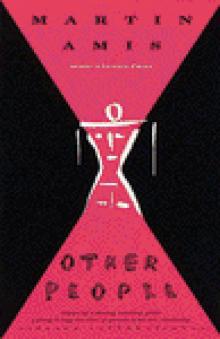 Other People
Other People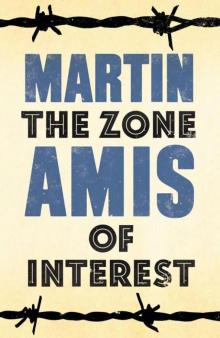 The Zone of Interest
The Zone of Interest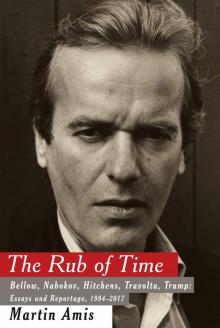 The Rub of Time: Bellow, Nabokov, Hitchens, Travolta, Trump
The Rub of Time: Bellow, Nabokov, Hitchens, Travolta, Trump Koba the Dread
Koba the Dread Success
Success London Fields
London Fields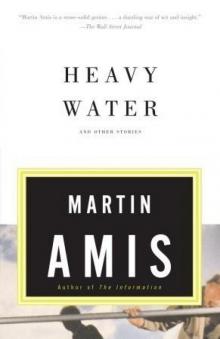 Heavy Water: And Other Stories
Heavy Water: And Other Stories Money
Money The Moronic Inferno and Other Visits to America
The Moronic Inferno and Other Visits to America Yellow Dog
Yellow Dog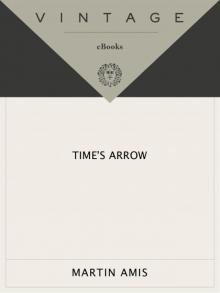 Time's Arrow
Time's Arrow Experience: A Memoir
Experience: A Memoir Einstein's Monsters
Einstein's Monsters The Pregnant Widow
The Pregnant Widow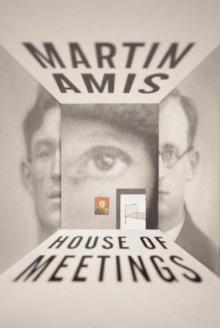 House of Meetings
House of Meetings The Information
The Information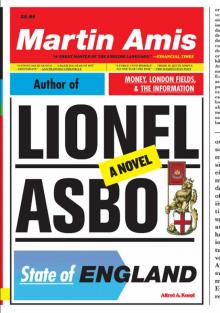 Lionel Asbo: State of England
Lionel Asbo: State of England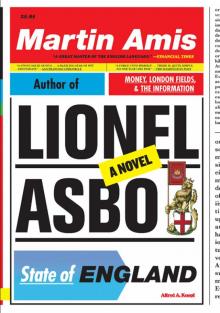 Lionel Asbo
Lionel Asbo Heavy Water and Other Stories
Heavy Water and Other Stories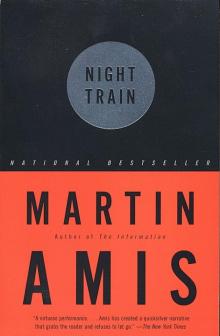 Night Train
Night Train Heavy Water
Heavy Water The War Against Cliche: Essays and Reviews 1971-2000 (Vintage International)
The War Against Cliche: Essays and Reviews 1971-2000 (Vintage International)